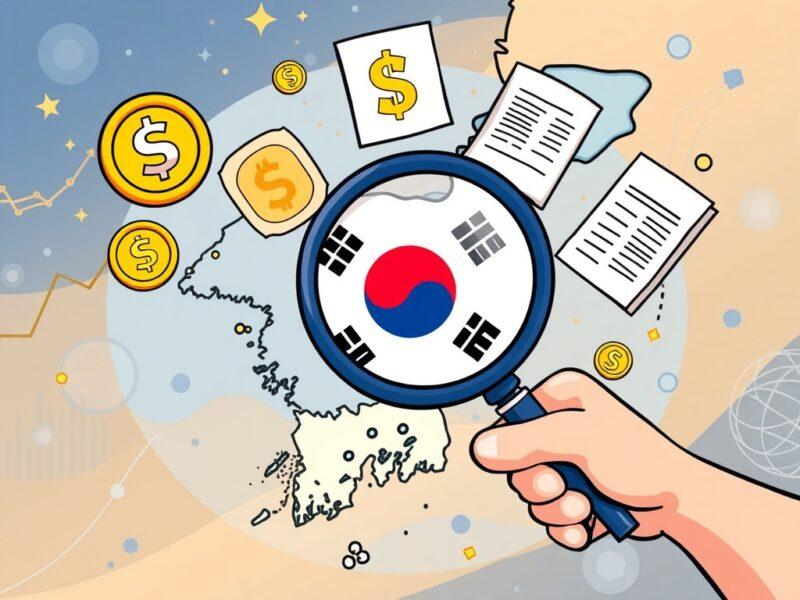South Korea Stablecoin Regulation: A Pivotal Move Towards Global Clarity
A significant development is underway in the world of digital finance, with South Korea taking a crucial step in stablecoin regulation. The Financial Intelligence Unit (FIU) under South Korea’s Financial Services Commission (FSC) has initiated a comprehensive study, showcasing the country’s commitment to fostering a secure environment for digital assets, particularly stablecoins, through proactive regulatory measures.
Importance of South Korea Stablecoin Regulation
On August 6th, the FSC’s FIU launched a critical study focusing on the second phase of virtual asset regulation, aiming to establish clear anti-money laundering (AML) procedures for stablecoins. This initiative seeks to integrate stablecoins into the existing financial framework to enable their legitimate use for payments and cross-border transfers, promoting innovation, protecting consumers, and ensuring financial stability by mitigating risks associated with illicit activities and market volatility.
Key Aspects of the Stablecoin Legislation
The upcoming stablecoin legislation not only emphasizes compliance but also aims to define the future role of these digital assets. The study will examine international regulatory approaches to stablecoins, emphasizing the adoption of best practices from major economies. Key aspects include:
- Reviewing global AML standards for stablecoins.
- Examining measures to combat the financing of terrorism (CFT) in the digital asset space.
- Assessing frameworks enabling stablecoins for daily transactions and cross-border transfers.
This comprehensive review seeks to create a secure regulatory environment that fosters innovation and shapes future stablecoin legislation.
Paving the Way for Comprehensive Virtual Asset Legislation
The effort extends beyond stablecoins to encompass broader virtual asset legislation in South Korea. This initiative underscores the country’s recognition of the evolving digital finance landscape and the need for clear rules governing all virtual assets. The FSC’s commitment to this study demonstrates a strategic vision to:
- Enhance market stability in the digital asset domain.
- Protect investors from potential scams and market manipulation.
- Position South Korea as a leader in responsible digital asset innovation and robust virtual asset legislation.
Establishing such legislation is crucial for building trust in the digital economy and promoting responsible growth.
Influence of Global Stablecoin Rules on South Korea
By focusing on global stablecoin guidelines, South Korea aims to learn from international precedents, mitigate risks, and implement effective, harmonized regulations. This global perspective is particularly crucial for assets like stablecoins that operate across borders. Insights gained from analyzing various global rules will inform South Korea’s regulatory framework, potentially setting a benchmark for other countries considering similar regulations.
In conclusion, South Korea’s proactive approach to stablecoin regulation, as demonstrated by the FSC’s comprehensive study, signifies a significant milestone. This effort paves the way for a safer, more transparent, and integrated future for digital assets within the country’s financial system, highlighting the global trend towards embracing stablecoins through distinct legislation.
Frequently Asked Questions (FAQs)
Q1: What is the main objective of South Korea’s FSC research study on stablecoins?
A1: The primary objective is to establish a comprehensive regulatory framework for stablecoins, including AML/CFT procedures, to safely integrate them into the financial system for payments and transfers.
Q2: How will this new legislation impact stablecoin usage in South Korea?
A2: It is expected to legitimize stablecoins for payments and cross-border transfers, providing clarity and security for users and businesses while mitigating risks.
Q3: What specific areas will the FSC study cover regarding stablecoins?
A3: The study will examine global regulatory approaches, analyze international AML and CFT standards, and evaluate frameworks for stablecoin usage in transactions.
Q4: Why is South Korea evaluating global stablecoin rules?
A4: By examining global precedents, South Korea aims to adopt best practices, prevent common risks, and ensure its regulations are effective and harmonized with international standards for cross-border assets.
Q5: Is this study part of a larger regulatory effort?
A5: Yes, this research study is an integral part of South Korea’s broader initiative to develop comprehensive virtual asset legislation for all types of digital assets.
Stay informed about these regulatory developments in the crypto space and join the conversation to raise awareness. Connect with us on social media to share your thoughts and insights.


